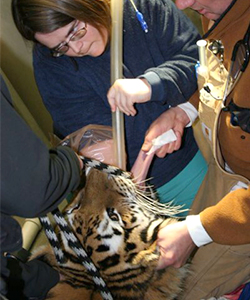Comprehensive Veterinary Anesthesia Care
As your best resource for anesthesia and pain management services, we are dedicated to maximizing the safety and comfort of your patients.
We offer comprehensive anesthesia and pain management care. Most think of anesthetic protocols as our primary responsibility, but we do so much more.
- Conduct a thorough physical exam
- Evaluate the animal’s condition and any disease that may impact their response to anesthesia
- Meet with the pet owner and explain the anesthetic care their pet will receive
- Prescribe or guide treatment to stabilize a patient and increase peri-anesthetic safety of the patient
- Manage all aspects of peri-procedural pain
- Directly oversee the administration of anesthesia, monitoring heart function, blood pressure, and respiration
- Monitor, diagnose, and treat anesthetic related complications that may arise and keep a legal record
- Recommend or provide treatment for post-operative and/or chronic pain
When you have a high risk patient, or a pet owner who is nervous about anesthesia, Southeast Veterinary Anesthesia Services can help.
Our advanced training and state-of-the-art equipment provide everyone involved with peace of mind. This level of expertise is greater than your team alone can provide, and is available to you as needed. We look forward to helping you care for your patients in the safest way possible.
Managing Risks Associated With Anesthesia
Because every anesthetic episode includes a measure of risk, we proactively prepare to minimize the onset of complications. We consider pre-existing conditions (kidney or heart disease) and take into account breed-specific predispositions. Based on the patient’s medical history and thorough examination, the anesthetic protocol is carefully created for each individual patient.
Excerpt from ACVAA position statement regarding the training process and role of board-certified veterinary anesthesiologists.
A veterinary anesthesiologist’s role in patient care extends beyond simply prescribing anesthetic drugs. Prior to anesthesia, a diplomate evaluates the animal’s physical condition and any disease that may negatively impact the animal’s response to anesthesia. They may prescribe (or guide) treatment to help stabilize the patient and to increase peri-anesthetic safety of the patient. Additionally they manage all aspects of peri-procedural pain, monitor, diagnose, and treat anesthetic-related complications that may arise and keep a legal record of the same. In addition to expertise in managing acute pain, many veterinary anesthesiologists can also make educated recommendations and/or provide treatment for chronic pain. They also provide consultation for veterinarians regarding anesthesia or analgesia care of individual patients.

